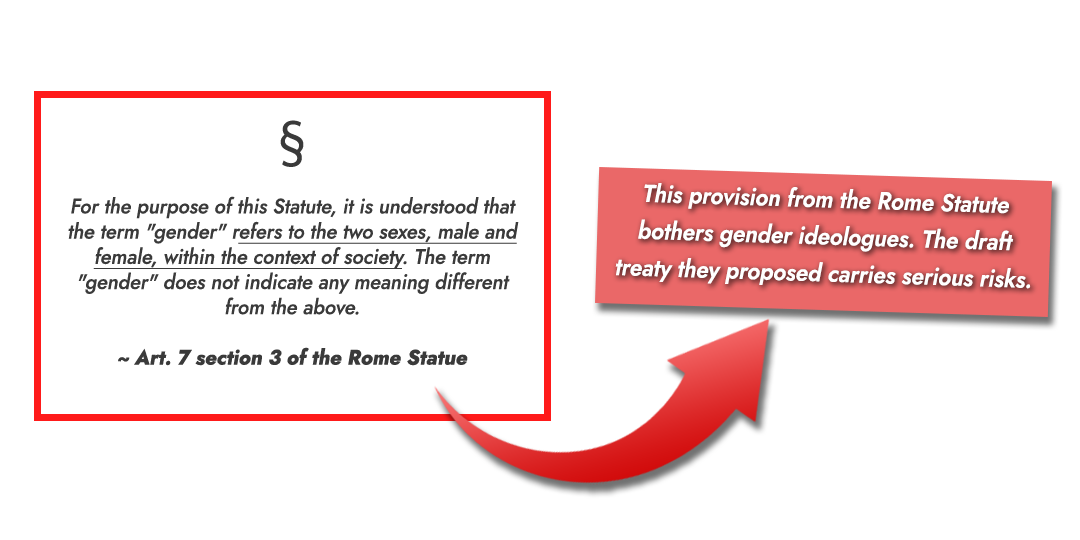UN International Law Commission,
Governments of the European Union states,
Crimes against humanity, as some of the most serious crimes against human life and dignity, must be met with an effective and decisive response. The international community would benefit from a new treaty on the Prevention and Punishment of Crimes Against Humanity, which has just been drafted by the United Nations, if it took a form that would ensure the aforementioned effectiveness of its enforcement. There is no room for ideology in any act of international law, especially one designed to help make our world a better place. We regret, therefore, that the UN International Law Commission is following momentary ideological trends present among the left-liberal political circles of the wider Western world.
Millions of people around the world continue to fall victims of crimes motivated by their religion, ethnicity, cultural background or gender. Focusing on the latter criterion, it must be firmly established that the UN International Law Commission’s proposed draft of a new treaty will hamper the prosecution of crimes motivated by the victims’ gender.
The 1998 Rome Statute of the International Criminal Court, currently in force, clearly indicated in Article 7(3) that “the term ‘gender’ refers to the two sexes, male and female, within the context of society. The term ‘gender’ does not indicate any meaning different from the above.” The use of this provision makes the Rome Statute legible, clear and precise, which also makes it more effective. The conscious decision to use the term “gender” without a clear indication of its meaning carries the risk of ineffective and erroneous application of the proposed legislation. In favor of maintaining the Rome Statute’s definition of gender speaks also the need for normative consistency in international law. Every inconsistency therein will undermine the authority of the International Criminal Court, which is particularly important at present. In this light it is crucial to maintain the existing definition of gender to avoid opening an area of unnecessary contention as compared to the consensus built in the development and adoption of the Rome Statute.
Rejecting the definition of gender as male and female will result in the recognition of gender as a social construct within which anything can fit. Adopting an ideologized, undefined concept of gender as a tool for socio-cultural change harms the idea of true protection for victims of crimes against humanity and will compromise the human rights protection system.
It will also worsen the legal situation of women, especially those living in regions of the world where their social position is clearly weaker than that of men.
Adoption of the new treaty as currently proposed could also lead to unfair accusations against people who recognize gender based on biological criteria, by will allowing for an interpretation of Article 2(1)(h) that implies that failure to recognize “non-binary gender identity” may constitute gender-based persecution.
There is also a serious risk that the current wording of the draft treaty will not be supported at the UN as it is in fact an attempt to impose on all the member states an ideological vision of the world that is shared by a minority present only in some countries of the wider West.
In view of the above, we urge the United Nations and the international community to implement the definition of gender contained in Article 7(3) of the Rome Statute in the proposed Treaty on the Prevention and Punishment of Crimes against Humanity. Turning the human rights system into a tool for bringing about socio-cultural change may mean not only discrediting, but also destroying its effectiveness, and consequently the collapse of the human rights system.
The UN International Law Commission is working on a new piece of legislation to counter crimes against humanity. However, the draft treaty is designed in an ideologized way that exposes the human rights system to ridicule. This is because it excludes the Rome Statute of the International Criminal Court’s definition of gender as a dichotomous division between men and women.

Deterioration of the situation of women
Rejecting the definition of gender as male and female will result in a worsening of the legal situation of women, especially those living in regions of the world where their social position is clearly weaker than that of men.
Prison for recognizing only two sexes
Adoption of the new treaty as currently proposed could lead to unfair accusations directed at people who recognize the biological criterion of gender differentiation. Failure to recognize “non-binary gender identity” could be interpreted as persecution.
Impasse in the development of human rights
There is also a substantial risk that the current wording will result in withdrawing of support for the treaty at the UN, due to the fact that it is essentially an attempt to impose an ideological vision of the world on all countries of the world.
